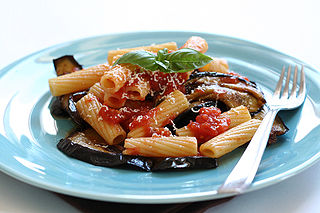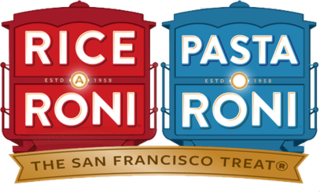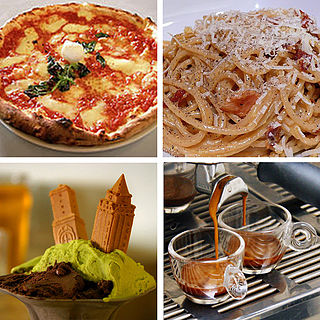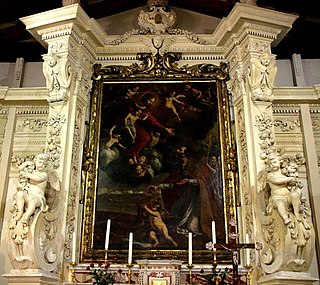
Pasta is a type of food typically made from an unleavened dough of wheat flour mixed with water or eggs, and formed into sheets or other shapes, then cooked by boiling or baking. Rice flour, or legumes such as beans or lentils, are sometimes used in place of wheat flour to yield a different taste and texture, or as a gluten-free alternative. Pasta is a staple food of Italian cuisine.

Sicily is the largest island in the Mediterranean Sea and one of the 20 regions of Italy. The Strait of Messina divides it from the region of Calabria in Southern Italy. It is one of the five Italian autonomous regions and is officially referred to as Regione Siciliana. The region has 5 million inhabitants. Its capital city is Palermo.

Spaghetti is a long, thin, solid, cylindrical pasta. It is a staple food of traditional Italian cuisine. Like other pasta, spaghetti is made of milled wheat and water and sometimes enriched with vitamins and minerals. Italian spaghetti is typically made from durum wheat semolina. Usually the pasta is white because refined flour is used, but whole wheat flour may be added. Spaghettoni is a thicker form of spaghetti, while capellini is a very thin spaghetti.

Sicilian cuisine is the style of cooking on the island of Sicily. It shows traces of all cultures that have existed on the island of Sicily over the last two millennia. Although its cuisine has much in common with Italian cuisine, Sicilian food also has Greek, Spanish, French and Arab influences.

Marsala is an Italian town located in the Province of Trapani in the westernmost part of Sicily. Marsala is the most populated town in its province and the fifth in Sicily.

Mazara del Vallo is a town and comune in the province of Trapani, southwestern Sicily, Italy. It lies mainly on the left bank at the mouth of the Mazaro river.

Gnocchi are a varied family of dumpling in Italian cuisine. They are made of small lumps of dough most traditionally composed of a simple combination of wheat flour, egg, salt, and potato. Variations of the dish exist, where individuals often supplement the simple recipe with flavour additives, such as semolina flour, cheese, breadcrumbs, cornmeal or similar ingredients, and possibly including herbs, vegetables, and other ingredients. Base ingredients may be substituted with alternatives - sweet potatoes for potatoes or rice flour for wheat flour, as examples. Such variations are often considered to be non-traditional.

Lasagna is a type of pasta, possibly one of the oldest types, made of very wide, flat sheets. Either term can also refer to an Italian dish made of stacked layers of lasagna alternating with fillings such as ragù, vegetables, cheeses, and seasonings and spices, like Italian seasoning, such as garlic, oregano and basil. The dish may be topped with grated cheese, which becomes melted after baking. Typically cooked pasta is assembled with the other ingredients and then baked in an oven. The resulting baked pasta is cut into single-serving square portions.

Arancini are Italian rice balls that are stuffed, coated with breadcrumbs and deep fried, and are a staple of Sicilian cuisine. The most common arancini fillings are: al ragù or al sugo, filled with ragù, mozzarella or caciocavallo cheese, and often peas, and al burro or ô burru, filled with ham and mozzarella or besciamella.

Rice-A-Roni is a pilaf-like boxed food mix that consists of rice, vermicelli pasta, and seasonings. To prepare, the rice and pasta are browned in butter, then water and seasonings are added and simmered until absorbed. It is a product of Quaker Oats Company, a subsidiary of PepsiCo.

Italian cuisine is a Mediterranean cuisine consisting of the ingredients, recipes and cooking techniques developed across the Italian Peninsula since antiquity, and later spread around the world together with waves of Italian diaspora. Significant changes occurred with the colonization of the Americas and the introduction of potatoes, tomatoes, capsicums, maize and sugar beet — the latter introduced in quantity in the 18th century. It is one of the best-known and most appreciated gastronomies worldwide.

Castelvetrano is a town and comune in the province of Trapani, Sicily, southern Italy. The archeological site of Selinunte is located within the municipal territory.
Associazione Sportiva Dilettante Campobello was an Italian association football club located in Campobello di Mazara, Sicily. Its colors were yellow and blue.

Unione Sportiva Dilettantistica Ragusa 2014 is an Italian association football club located in Ragusa, Sicily. It currently plays in Serie D.

Giovanni Quagliata (1603–1673) was an Italian painter of the Baroque period. He is more properly known in Italy as Giovan Battista Quagliata, one of the leading artists of the Messinesi painters of the 17th century, as described by Francesco Susinno in his book "The Lives of the Messinesi Painters" published in 1724. Giovanni was born in Messina, Italy. He was a pupil of Pietro da Cortona and enjoyed the patronage and friendship of the Spanish Viceroy of Sicily, Don Juan José of Austria. Giovanni's brother, Andrea Quagliata, was also an historical painter, but of lesser significance. Giovanni's works – paintings, frescoes and large canvases – were famously displayed in the galleries and churches of Messina, but due to earthquakes from Mount Etna and wartime bombings, few have survived to the present day.

The Italian Catholic Diocese of Mazara del Vallo is in far western Sicily. It is a suffragan of the Archdiocese of Palermo.

De Cecco is an Italian company producing dried pasta, flour and other related food products. It is the third largest manufacturer of pasta in the world.

Domenico Caracciolo, marquess of Villamaina was diplomat and politician in the Kingdom of Naples.
Martín Ezequiel Rose is an Argentine professional footballer who plays as a midfielder.

















